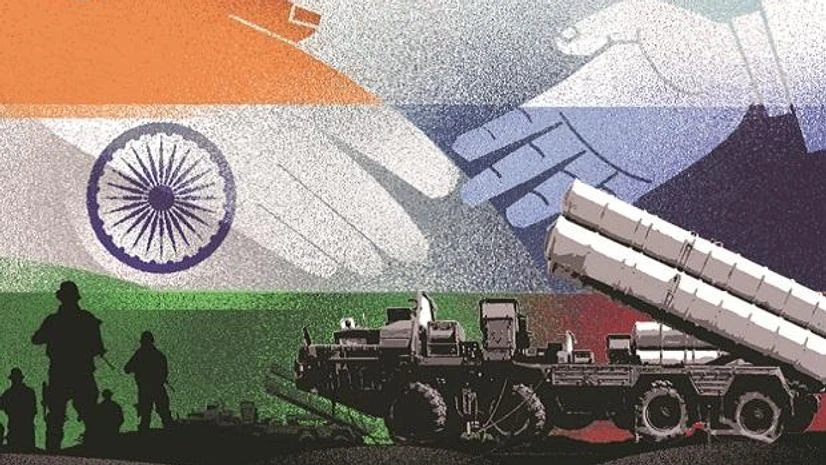Amidst suspense over the United States imposing Countering America's Adversaries Through Sanctions Act (CAATSA) on India for its recent S-400 missile purchase from Russia, Ambassador of Russia to India, Nikolay Kudashev, said that such sanctions will not be a pressure in India-Russia defence deals and the two countries will further intensify their military cooperation and defence purchases in the coming days.
"CAATSA will not be a pressure between India and Russia Defence deals...Ours is an old relationship, strategic partnership and defence cooperation. In the next two-three months you will see deals on frigates and Kalashnikovs. There can be more. Just wait for it," Kudashev said.
In this context, the Russian envoy mentioned that the recent conclusion of purchase of S-400 missile deal worth $5.4 billion was one of the biggest deals between the two countries. "It was negotiated and concluded very fast," Kudashev said while adding that this deal was not done to "defy" anyone, or was about "arms race" or "countering CAATSA".
Kudashev's statement comes after United States President Donald Trump on Wednesday set a suspense ball rolling over his take on India-Russia recent S-400 Triumph air defence missile deal. He said that India will soon find out whether the CAATSA will be levied on the country for the purchase of high calibre missile systems from Russia.
In what could be seen as an attempt to underplay the S-400 purchase, the much-awaited deal for the missiles was not mentioned by Russian President Vladimir Putin and Prime Minister Narendra Modi in their statements before the media but listed in the joint statement.
Justifying this, the Russian ambassador said that it was not due to any fear for CAATSA or pressure from the US that the deal was underplayed. "Our military and defence cooperation is important but it is not the only thing between our bilateral relationships. There are several other aspects too. The relationship between India and Russia is very close," Kudashev said.
The envoy added that during Putin's visit to India last week, the two countries discussed strategies to identify common priority areas and how to protect their trade relationship from unpredictable factors like CAATSA.
More From This Section
"The two leaders (President Putin and Indian Prime Minister Narendra Modi) discussed ways to relax international tension, developing strategy in bilateral cooperation, to identify common priority and how to protect their trade and economic relationship from unpredictable factors like sanctions," Kudashev said while elaborating on discussions between President Putin and Prime Minister Modi last week.
He added that the Indian side, particularly Defence Minister Nirmala Sitharaman, made it clear that India only recognises sanctions by the United Nations and not any country-specific prohibitions.
"CAATSA is a problem and not the right way to do things or talk to people. It is an instrument of political pressure," the Russian envoy said. Adding to his comment, Russia's Deputy Chief of Mission Anatoly Kargapolov said that India is an independent country and both Russia and India want to see each other strong.
Talking about other defence purchases, Kudashev said that negotiations for Fifth Generation Fighter Aircraft (FGFA) is still on agenda but India's priority at present is S-400, frigates, helicopters and assault rifles.
"FGFA deal will be back very shortly," Kudashev said. He added that the negotiations for assault rifles from Kalashnikov Concern for the AK 100 plus series are continuing under Make in India. "Kalashnikov will be there too. Just be patient," the envoy said. He clarified that more deals could not get signed during President Putin's visit because the documents were not ready.
Taking cue from the India-US pacts on Logistics Exchange Memorandum of Agreement (LEMOA) and Communications Compatibility and Security Agreement (COMCASA), the Russian side is now keen to have similar agreements with India under similar framework umbrella. "Given the level of our military and defence cooperation, I think the two sides need to have a stronger legal basis like these (LEMOA, COMCASA) to secure our interests," Kudashev said.
Meanwhile, dispelling concerns over growing Russian proximity to Pakistan, Kudashev said that Moscow's relationship with Islamabad should not be a cause of concern for New Delhi. "What is the matter? Our trade (with Pakistan) is almost nil. Our military cooperation is only limited to counterterrorism exercises and not as big as with India. Our engagement with Pakistan continues because we feel that some efforts should be made to bring Pakistan to the region and convince them to invest in common interest, common good. No sensible person in Russia wants strategic relations with Pakistan," Kudashev added.
Putin visited India to attend the 19th India-Russia bilateral annual summit. During his visit, India and Russia signed several agreements on Friday including the much-awaited agreement for the purchase of five S-400 Triumph air defence missile systems. India and Russia also signed eight agreements that ranged from space cooperation to nuclear and transport sector. The civil nuclear agreement will pave way for new nuclear power projects of Russian design in India, and collaboration in third countries. Russia has also expressed its support for India's membership of the Nuclear Suppliers Group and in United Nations Security Council.

)
